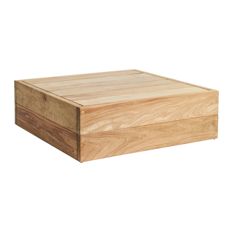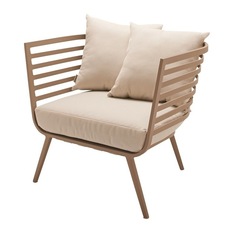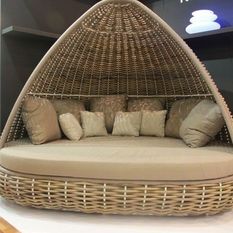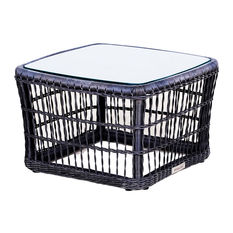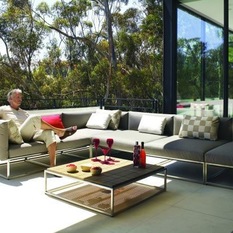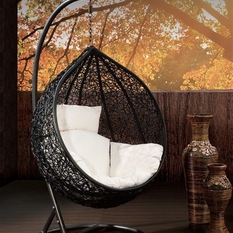2,340 Outdoor Furniture
Durable, easy-care outdoor furniture is the quickest way to dress up a garden, deck or patio. An outdoor setting, complete with table and chairs, is the best way to accommodate a dozen or so people during a backyard barbecue, while a single hammock suits the lone contemplator who escapes to the garden for some quiet; add some deck chairs to your garden entrance or beside the pool and you’ll never want to stay indoors for long. More
With so many styles and variations on the market, finding affordable furniture is easy – the hard part is narrowing down your options. Take onboard the following advice to make shopping that little bit easier.
Before you add items to your shopping cart, find out the dimensions of your backyard, then access how you will be using the space. Whether you’re fitting out an expansive backyard or adding seating to a small balcony, avoid overcrowding with too much furniture, and allow enough room for guests to comfortably access and walk around tables and chairs. If you love entertaining, choose an outdoor setting that consists of at least four seats – additional fold-away seats can be added when guests are around, or you could opt for outdoor stools and benches, which take up less floor space. For a large area, look for an outdoor setting that consists of multiple items – some include outdoor lounges, chairs, tables, and even umbrellas. Choosing furniture from the same line or as a set will ensure you create a cohesive, consistent look. For something you can sink into, consider adding a hammock, daybed or swing chair, which look ideal on verandahs or in cosy garden nooks, space permitting.
Metal outdoor furniture, made from light metals like powder-coated aluminium or heavy metals like wrought iron, is aesthetically timeless and strong against the elements. Wrought iron is the most durable, and can last years, but can be impractical in small spaces due to its heaviness. Aluminium, on the other hand, is easy to move to around and is cool to the touch even when exposed to the sun’s intense heat. Timber outdoor furniture – the most common variety being teak – is also cool to the touch and durable, but needs to be treated properly to avoid rot and decay. Plastic furniture may be flimsy, but is well equipped for wet weather as it won’t rust, rot or need repainting. It also tends to be the most inexpensive option and can be easily stored away. Cane and wicker outdoor furniture – especially rattan or bamboo – has a lovely rustic aesthetic but isn’t as viable as other materials against rain and humidity, unless mixed with synthetic fibres. Aluminium frames, however, would make wicker sets more durable. If you’re considering furniture that is padded, look for polyester fillings that dry quickly and zippers that are weatherproof. Check for brass and stainless steel screws, too, which go a long way in increasing outdoor furniture’s lifespan. Finally, don’t forget that outdoor tables and chairs will be exposed to the elements all year long, so ensure the pieces you choose are UV-resistant and waterproof.
Sun, rain and wind will take its toll on even the most durable outdoor settings, but there are a number of things you can do to keep yours looking new for longer. Direct sunlight will cause timber, plastic and fabrics to fade, so position outdoor settings in a shaded area such as under a gazebo or outdoor umbrella. When not in use, bring items inside, or protect them with outdoor furniture covers, designed specially for this purpose. If this isn’t an option, at least consider bringing any cushions or padding inside. Apply furniture and fabric protectors and maintain timber furniture with the correct oils and stains. Finally, avoid using harsh chemicals when cleaning and, when using detergent, always test a small area first.
How much outdoor furniture should I buy?
Before you add items to your shopping cart, find out the dimensions of your backyard, then access how you will be using the space. Whether you’re fitting out an expansive backyard or adding seating to a small balcony, avoid overcrowding with too much furniture, and allow enough room for guests to comfortably access and walk around tables and chairs. If you love entertaining, choose an outdoor setting that consists of at least four seats – additional fold-away seats can be added when guests are around, or you could opt for outdoor stools and benches, which take up less floor space. For a large area, look for an outdoor setting that consists of multiple items – some include outdoor lounges, chairs, tables, and even umbrellas. Choosing furniture from the same line or as a set will ensure you create a cohesive, consistent look. For something you can sink into, consider adding a hammock, daybed or swing chair, which look ideal on verandahs or in cosy garden nooks, space permitting.
What are the best materials for outdoor furniture?
Metal outdoor furniture, made from light metals like powder-coated aluminium or heavy metals like wrought iron, is aesthetically timeless and strong against the elements. Wrought iron is the most durable, and can last years, but can be impractical in small spaces due to its heaviness. Aluminium, on the other hand, is easy to move to around and is cool to the touch even when exposed to the sun’s intense heat. Timber outdoor furniture – the most common variety being teak – is also cool to the touch and durable, but needs to be treated properly to avoid rot and decay. Plastic furniture may be flimsy, but is well equipped for wet weather as it won’t rust, rot or need repainting. It also tends to be the most inexpensive option and can be easily stored away. Cane and wicker outdoor furniture – especially rattan or bamboo – has a lovely rustic aesthetic but isn’t as viable as other materials against rain and humidity, unless mixed with synthetic fibres. Aluminium frames, however, would make wicker sets more durable. If you’re considering furniture that is padded, look for polyester fillings that dry quickly and zippers that are weatherproof. Check for brass and stainless steel screws, too, which go a long way in increasing outdoor furniture’s lifespan. Finally, don’t forget that outdoor tables and chairs will be exposed to the elements all year long, so ensure the pieces you choose are UV-resistant and waterproof.
How can I extend the life of my outdoor setting?
Sun, rain and wind will take its toll on even the most durable outdoor settings, but there are a number of things you can do to keep yours looking new for longer. Direct sunlight will cause timber, plastic and fabrics to fade, so position outdoor settings in a shaded area such as under a gazebo or outdoor umbrella. When not in use, bring items inside, or protect them with outdoor furniture covers, designed specially for this purpose. If this isn’t an option, at least consider bringing any cushions or padding inside. Apply furniture and fabric protectors and maintain timber furniture with the correct oils and stains. Finally, avoid using harsh chemicals when cleaning and, when using detergent, always test a small area first.
